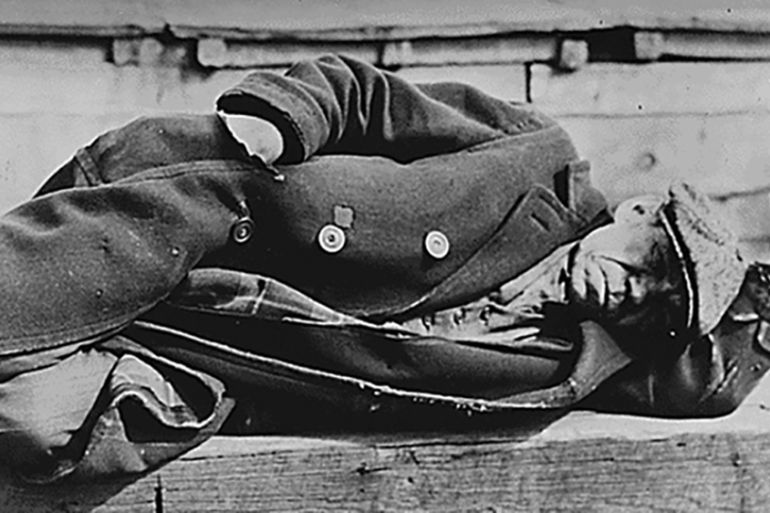Coronavirus economy: Recession or depression?
Many economists have come around to the view that coronavirus disruptions will trigger a global recession.

More economists are warning of a recession in the United States, Europe and globally as coronavirus containment measures bring entire sectors of the world’s economy to a halt. Many have also compared the swiftness and severity of the coronavirus slowdown with the Great Depression that began in 1929.
Are we looking at a recession? Or a depression? And what exactly is the difference?
Keep reading
list of 4 itemsMexico’s teachers seek relief from pandemic-era spike in school robberies
‘A bad chapter’: Tracing the origins of Ecuador’s rise in gang violence
Why is the US economy so resilient?
What is a recession?
A recession has traditionally been defined as two consecutive quarters or six straight months of negative economic growth. In the US, though, the National Bureau of Economic Research (NBER) defines a recession as “a significant decline in economic activity spread across the economy, lasting more than a few months, normally visible in real GDP, real income, employment, industrial production, and wholesale-retail sales.”
What does the NBER mean by ‘real’? And while we’re at it – what is GDP?
Real means “adjusted for inflation”. GDP stands for gross domestic product – a measure of the value all the goods and services produced by an economy within a certain timeframe.
Got it. So why do we care what the NBER says?
Because the NBER dates the business cycle – the peaks and troughs of economic activity – it actually has the measurements to determine when a recession is, well, a recession.
The NBER is not a government entity, by the way. It’s a private, non-profit, non-partisan research organisation. It also publishes really interesting working papers, like this one examining what the Spanish flu pandemic of the early 1900s can tell us about the economic fallout from coronavirus.
Understood. So how long can recessions last?
It depends. By NBER’s definition, a recession does not necessarily have to last a minimum of 6 months. And some downturns continue for well over a year. The Great Recession in the US started in December 2007 and lasted until June 2009. That’s 18 months in total. Nigeria fell into its first recession in a generation at the start of 2016 and did not emerge from it until the second quarter of 2017.
What made the Great Recession ‘great’?
The “Great” Recession earned that moniker because it was the worst crisis the US economy had experienced since the Great Depression of 1929. The name also turned out to be appropriate because it was the longest-lasting of the 17 recessions that the US has experienced to date.
What is a depression, then?
There is no set definition for a “depression”, but when a country is faced with a prolonged economic downturn that is measured in years, rather than quarters – then you can be pretty certain it is experiencing a depression. The Great Depression, for example, began in 1929 and lasted until 1939.
Could the coronavirus pandemic trigger a recession?
Most economists have come around to that view. Last week, the International Monetary Fund said it sees negative global growth this year, and warned that we’re facing “a recession at least as bad as during the global financial crisis or worse”.
Many Wall Street economists also see a recession in the cards. Goldman Sachs thinks US economic output could nosedive 24 percent from April through June compared with a year earlier, and that the unemployment rate could peak at nine percent in the months ahead. Capital Economics sees second-quarter US economic growth plunging 40 percent from a year earlier and unemployment spiking to 12 percent.
OK, this is sounding scary. Could we be heading for a (gulp) depression?
No one can say for sure what the future holds. Some economists think that economic activity could actually pick up in the second half of this year, depending on government stimulus packages, when the coronavirus crisis peaks and other factors.
So why do we keep hearing the words ‘coronavirus’ and ‘depression’ together?
When you do hear or read the word “depression” alongside “coronavirus”, it is usually analysts drawing comparisons with the suddenness and severity of the economic slowdown that happened in 1929.
But what do veterans from the 2008 financial crisis think?
Economist Nouriel Roubini, who warned about the 2008 financial crisis as early as 2006, thinks a rebound later this year is unlikely. In a column for Project Syndicate, Roubini – aka “Dr Doom” – argued that public health responses in advanced economies have fallen short of what is needed to contain the pandemic, and that fiscal packages are “neither large nor rapid enough to create the conditions for a timely recovery”. For these reasons, he says, “the risk of a new Great Depression, worse than the original – a Greater Depression – is rising by the day”.
On the other hand, former Federal Reserve Chairman Ben Bernanke, who stewarded the US economy through the 2008 financial crisis, told business news network CNBC that the current shock the US economy is experiencing from coronavirus is “much closer to a major snowstorm or a natural disaster than it is to a classic 1930s-style depression”.